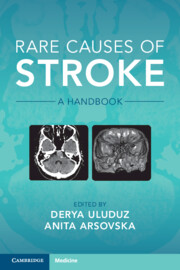Book contents
- Rare Causes of Stroke
- Rare Causes of Stroke
- Copyright page
- Contents
- Contributors
- Preface
- 1 Inflammatory Conditions
- 2 Infectious and Postinfectious Vasculitis
- 3 Hypercoagulable Causes of Stroke
- 4 Drug-Related Stroke
- Chapter 4.1 Medication-Related Stroke
- Chapter 4.2 Illicit-Drug-Related Stroke
- 5 Hereditary and Genetic Causes of Stroke
- 6 Rare Causes of Cardioembolism
- 7 Vasospastic Conditions and Other Vasculopathies
- 8 Other Non-inflammatory Vasculopathies
- 9 Venous Occlusive Conditions
- 10 Bone Disorders and Stroke
- Index
- References
Chapter 4.1 - Medication-Related Stroke
from 4 - Drug-Related Stroke
Published online by Cambridge University Press: 06 October 2022
- Rare Causes of Stroke
- Rare Causes of Stroke
- Copyright page
- Contents
- Contributors
- Preface
- 1 Inflammatory Conditions
- 2 Infectious and Postinfectious Vasculitis
- 3 Hypercoagulable Causes of Stroke
- 4 Drug-Related Stroke
- Chapter 4.1 Medication-Related Stroke
- Chapter 4.2 Illicit-Drug-Related Stroke
- 5 Hereditary and Genetic Causes of Stroke
- 6 Rare Causes of Cardioembolism
- 7 Vasospastic Conditions and Other Vasculopathies
- 8 Other Non-inflammatory Vasculopathies
- 9 Venous Occlusive Conditions
- 10 Bone Disorders and Stroke
- Index
- References
Summary
A 53-year-old woman, with no vascular risk factors or significant previous medical history experienced first ischemic stroke and was successfully treated with thrombolysis. A thorough diagnostic work-up and long term follow up did not reveal any cardiovascular condition, the patient had been on hormone replacement therapy for 7 years at the time of the cerebrovascular accident. Effect of hormone replacement therapy and the role of other commonly prescribed drugs on the stroke burden risk are briefly discussed. Individualized therapeutic plan balancing risks, benefits, comorbidities and patients choice is recommended to reduce stroke burden especially in patients needing polytherapy
Keywords
- Type
- Chapter
- Information
- Rare Causes of StrokeA Handbook, pp. 185 - 189Publisher: Cambridge University PressPrint publication year: 2022

